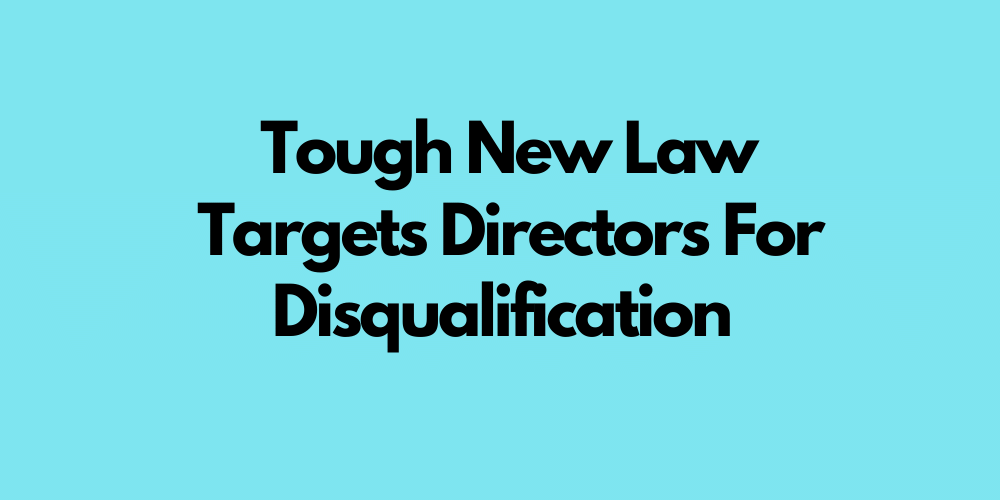What is The Rating (Coronavirus) and Directors Disqualification (Dissolved Companies) Act?

Introduction: The Rating (Coronavirus) and Directors Disqualification (Dissolved Companies) Act
This article is about the Rating (Coronavirus) and Directors Disqualification (Dissolved Companies) Act. The act was introduced in order to help protect people and businesses from the coronavirus. The act allows the government to rate companies based on their risk of being infected with the virus. Companies that are rated as high risk can be disqualified from directors.
What is the Directors Disqualification (Dissolved Companies) Act?
But when you fail to act in time, fail to act reasonably, fail to keep books and records, continue taking credit, KNOWING that your company cannot fully repay the debt, you're at high economic risk and may even lose all your possessions. So, act now and get help for your company and, most importantly, begin reducing your own risks.
What are the effects of the Directors Disqualification (Dissolved Companies) Act?
Introduced in 2006, the Directors Disqualification (Dissolved Companies) Act allows the Secretary of State to disqualify a director of a company that has been dissolved. The act is designed to protect creditors and investors by preventing company directors from continuing to operate companies in which they have caused financial harm and then used the dissolution process to avoid investigation by the Insolvency Service. To date, the act has been used sparingly, but it is hoped that its use will increase as courts become more familiar with its provisions.
Prior Laws for Director Disqualification on Dissolution of a UK Ltd Company
In October of 2017, the English government passed a new law that was designed to prevent directors from dissolving their businesses in order to avoid investigation. The new law, called the “Director Disqualification (Amendment) Regulations 2017”, amends an earlier law that was passed in 2006. The original law made it easier for directors to dissolve their businesses in order to avoid being investigated for wrongdoing.
The 2017 law, which came into effect on October 30th, 2017, makes it more difficult for directors to dissolve their businesses. In addition, the new law allows the Insolvency Service (an agency of the English government that investigates and prosecutes cases of corporate insolvency) to investigate directors who have dissolved their businesses.
The new updated law that was chiefly designed to prevent directors dissolving businesses from being investigated is known as the Rating (Coronavirus) and Directors Disqualification (Dissolved Companies) Act 2021.
The Rating (Coronavirus) and Directors Disqualification (Dissolved Companies) Act 2021 is a new piece of legislation that was passed in the aftermath of the coronavirus pandemic. The act allows the government to rate companies according to their risk of collapse, and to disqualify directors of companies that have been dissolved. The act is designed to prevent another financial crisis like the one caused by the coronavirus.
Prior to that the Insolvency Service reported how it had pursued several rogue directors who committed BBLS fraud, including a director of a cleaning company who signed a 9 year disqualification undertaking after an investigation found he had committed BBLS fraud using a dissolution process.
Directors of Dissolved Companies and COVID Fraud
In the wake of the COVID pandemic, several individuals have taken advantage of the situation by creating fraudulent schemes. One such scheme is perpetrated by individuals who are directors of dissolved companies. These individuals create a new company and appoint themselves as director, then solicit investments from victims by claiming that the company has a product or service that will help them survive or profit from the COVID pandemic. Victims have lost millions of pounds in this scam and the company directors had previously avoided investigation by the Insolvency Service for unlawful use of dissolving a limited company at Companies House using form DS01.
Combatting Bounce Back Loan Fraud
The Rating (Coronavirus) and Directors Disqualification (Dissolved Companies) Act is a new act that was passed in the United Kingdom in 2020. The act is designed to help protect people and businesses from the effects of the coronavirus pandemic and to combat Bounce Back Loan fraud. The act allows the government to disqualify directors of companies that have been dissolved due to the coronavirus pandemic. The act also allows the government to rate companies based on their risk of being affected by the virus.
What is the UK's The Rating (Coronavirus) and Directors Disqualification (Dissolved Companies) Act?
The Rating (Coronavirus) and Directors Disqualification (Dissolved Companies) Act is a new piece of UK legislation that came into effect on April 1, 2020. The act is designed to help protect consumers from the risks associated with the coronavirus pandemic, by making it easier for the government to shut down businesses that are deemed to be a risk to public health. The act also makes it easier for the government to disqualify directors of companies that have been dissolved due to their involvement in coronavirus-related scams or frauds. Company Directors disqualification is now more likely to be the result from an investigation into why the owners entered into a dissolution process at Companies House (using form DS01) to close down their UK limited company in order to avoid insolvency and avoid investigation by the insolvency service.
How does The Rating (Coronavirus) and Directors Disqualification (Dissolved Companies) Act work?
The Rating (Coronavirus) and Directors Disqualification (Dissolved Companies) Act is a new piece of legislation that came into effect in the United Kingdom on April 6, 2020. The act is designed to help protect businesses and consumers from the effects of the coronavirus pandemic. Under the act, directors of companies that have been dissolved due to the coronavirus pandemic may be disqualified from serving as a director in any other company. The act also gives creditors of dissolved companies priority over other creditors in the distribution of assets.
What are the benefits of The Rating (Coronavirus) and Directors Disqualification (Dissolved Companies) Act?
The following is commonly referred to art experts as the "lifting of the veil of incorporation" that shields escape artists from liability. In this context, the sort of activity takes on critical importance. If you happen to partake in this, you may be held responsible for the income taxes owed, VAT refunds, and bankruptcy liabilities you could have known about ahead of time.
Directors who violate Company Directors Disqualification Act 1986 may be suspended from office for up to 15 years, they can be fined, and may face the loss of their property and personal assets, including their home.
How will The Rating (Coronavirus) and Directors Disqualification (Dissolved Companies) Act impact businesses and Company Directors when dissolving their UK limited companies?
The Rating (Coronavirus) and Directors Disqualification (Dissolved Companies) Act will come into effect on 6 April 2019, and is a significant piece of legislation designed to protect businesses and Company Directors when dissolving their UK limited companies. The act sets out specific requirements for the dissolution of a company, including the appointment of an appropriate insolvency practitioner. It also introduces new disqualification provisions that will apply to directors of companies that have been dissolved.
Alternatives to Dissolving a company when Trading Whilst Insolvent
It's a legitimate move to actually sell your company to avoid insolvency. Found how you can sell your UK company today, and walk away from liabilities for a tiny fraction of the cost of UK Insolvency fees.
Directors who violate Company Directors Disqualification Act 1986 may be suspended from office for up to 15 years, they can be fined, and may face the loss of their property and personal assets, including their home.
Simple & Low Cost Alternative to Liquidation
However, there is a simple and low cost alternative to insolvency for your UK limited company.
You can legitimately sell your business to a third party, along with all the business' debts and liabilities. It's fast, easy and very low cost when compared to liquidation, bankruptcy and insolvency.
Get your Free Guide here
Struggling with your limited company? Can't pay its debts? We can help.
We rescue companies. Using a low cost & little known alternative to insolvency.
Find out more




